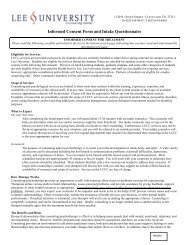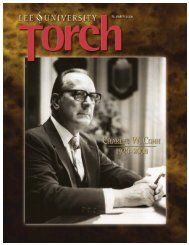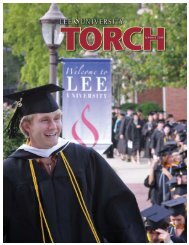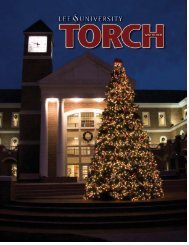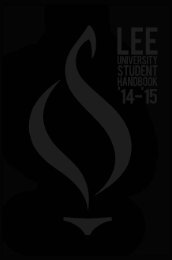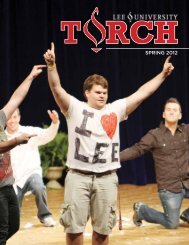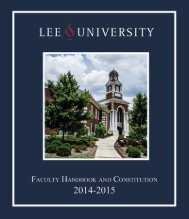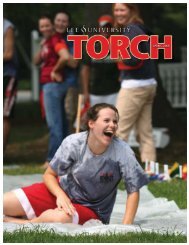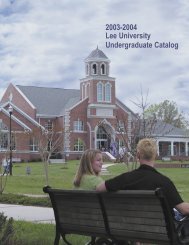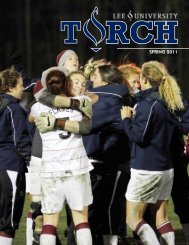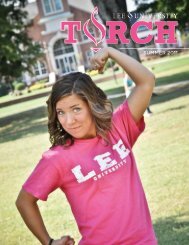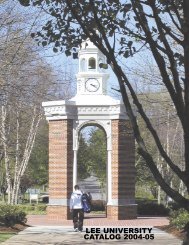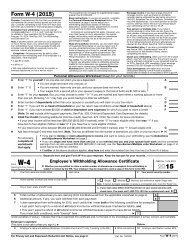Undergraduate - Lee University
Undergraduate - Lee University
Undergraduate - Lee University
You also want an ePaper? Increase the reach of your titles
YUMPU automatically turns print PDFs into web optimized ePapers that Google loves.
DEPARTMENT OF NATURAL SCIENCES AND MATHEMATICS 191<br />
BIO 392. TROPICAL BIODIVERSITY<br />
Four hours credit<br />
A course that covers themes pertaining to the rich diversity of life in the tropics.<br />
Ecology, evolutionary biology, and natural history of tropical organisms will be explored in<br />
depth. This course will present the use of scientific methodology and discuss issues related<br />
to the natural environment and human activity in the tropics. There will be an emphasis on<br />
attaining foreign experience in the field component of this course. Prerequisites: BIO<br />
111,112 and formal acceptance to attend the course (Biodiversity Field Study Program).<br />
Offered summers on demand.<br />
BIO 393. PRINCIPLES OF ECOLOGY<br />
Four hours credit<br />
Relationships within natural populations, communities, and ecosystems with reference<br />
to energy flow, limiting factors and behavior patterns of organisms in their environment.<br />
Human population ecology, global resource availability and exploitation, human environmental<br />
impacts and methods of stewardship of God’s creation. 150 minutes lecture and 170<br />
minutes lab per week. Field trips will be required. Prerequisites: BIO 111–112 or BIO 104.<br />
Offered Fall Semester, even years.<br />
BIO 395. HEALTH PERSPECTIVES: CANCER AND AIDS<br />
Three hours credit<br />
A survey of the nature, causes, prevention, treatment, and future prospects of each disease.<br />
Although intended primarily for aspiring health professionals, it would be of benefit to<br />
everyone interested in learning more about these conditions and their impact on human society.<br />
Cancer will be the focus in even years and AIDS will be the focus in odd years.<br />
Prerequisites: BIO 103 (non–majors); BIO 111, 112, 251 (majors); BIO 292, 293 (strongly suggested<br />
for majors). Offered Fall Semester.<br />
BIO 403. CELL BIOLOGY LAB<br />
Two hours credit<br />
A course that offers an introduction to the principles and techniques for the study of<br />
cells, their organelles, and their molecular composition and distribution. The four types<br />
of cellular macromolecules are manipulated via various techniques in electrophoresis,<br />
chromatography, capillary blotting, centrifugation, and biochemical reduction.<br />
Additionally, selected recombinant DNA techniques will introduce students to molecular<br />
cloning strategies and procedures. 180 minutes laboratory per week. Prerequisites:<br />
BIO 251, 303; or permission of instructor. Offered on demand.<br />
BIO 421. PLANT PHYSIOLOGY<br />
Four hours credit<br />
Cellular and organismic process occurring in plants, including transport phenomena,<br />
metabolic processes and regulation of growth and development. 150 minutes lecture and 110<br />
minutes lab per week. Prerequisites: BIO 111-112 and CHY 111-112. Offered Fall Semester,<br />
on demand.<br />
BIO 431. STRUCTURAL HISTOLOGY<br />
Three hours credit<br />
An introductory course in the study of cells, tissues, and organs. Special emphasis will be<br />
placed on the relationship between structural organization and function. This course will meet<br />
for 110 minutes lecture and 110 minute laboratory per week. Prerequisites: BIO 111-112, CHY<br />
111-112, or permission of the instructor. Offered Spring Semester, on demand.<br />
BIO 432. IMMUNOLOGY<br />
Three hours credit<br />
A foundation study of current concepts and procedures in immunology. An examination<br />
of the immune system in both health and disease is emphasized. Prerequisites: CHY 111-112<br />
or 113, BIO 251, BIO 303 and BIO 252, 292, 293 (strongly recommended). Offered Spring<br />
Semester.<br />
BIO 433. SCIENCE AND SCRIPTURE<br />
Three hours credit<br />
Comparative study of related scientific and theological ideology with emphasis upon<br />
areas of apparent discrepancy. Through lecture, research papers, and guided class discussion,<br />
an attempt is made to demonstrate the necessity and possibility of harmonizing scientifiic<br />
and biblical truth. Not to be counted toward an endorsement for teacher certification<br />
in biology. Offered every semester.<br />
BIO 441. PARASITOLOGY<br />
Four hours credit<br />
Life cycles, epidemiological factors, interrelationships of parasite and host, and underlying<br />
principles of treatment and prevention. 150 minutes lecture and 110 minutes lab per<br />
week. Prerequisites: BIO 111-112. Offered on demand.



